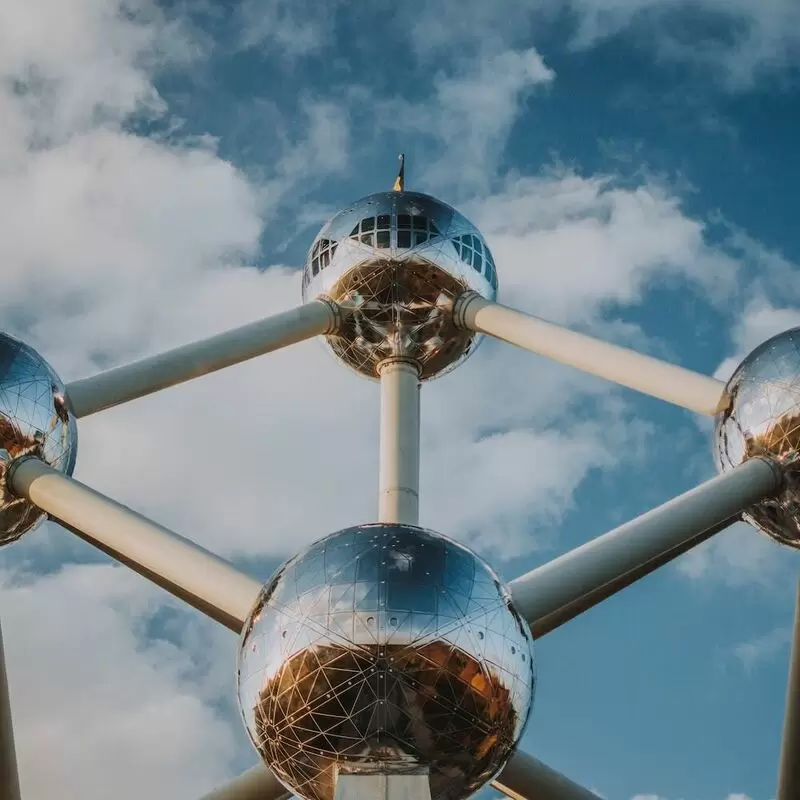
1. Grand Place
A visit to the Grand Place is an absolute must when visiting Brussels! This UNESCO World Heritage Site is one of the most beautiful squares in the world, adorned with opulent and detailed Baroque and Gothic buildings. Every August, a magnificent floral carpet is laid out, transforming the square into a living tapestry. Just a stone's throw away, you can enjoy Belgian classics at local bistros or marvel at the whimsical Manneken Pis statue.
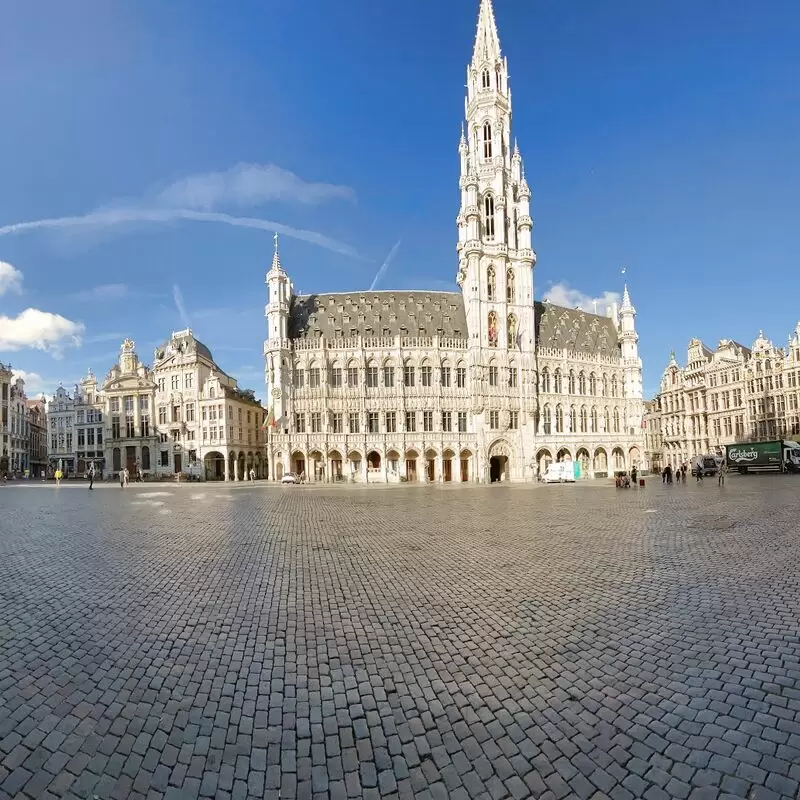 Grand Place
Grand Place
Grote Markt, Pentagone 1000 Brussels

Grote Markt, Pentagone 1000 Brussels
2. Atomium
The Atomium is an architectural wonder, world-famous as a symbol of Brussels and Belgium, and not to be missed. This unique structure, which has the shape of an iron crystal cell magnified 165 billion times, offers a panoramic view from its top sphere. It's more than just a model: inside you'll find exhibitions, a restaurant and even a hotel room! Don't forget to explore the surrounding Atomium Park and marvel at Mini-Europe right next door, where Europe's famous landmarks are recreated in miniature.
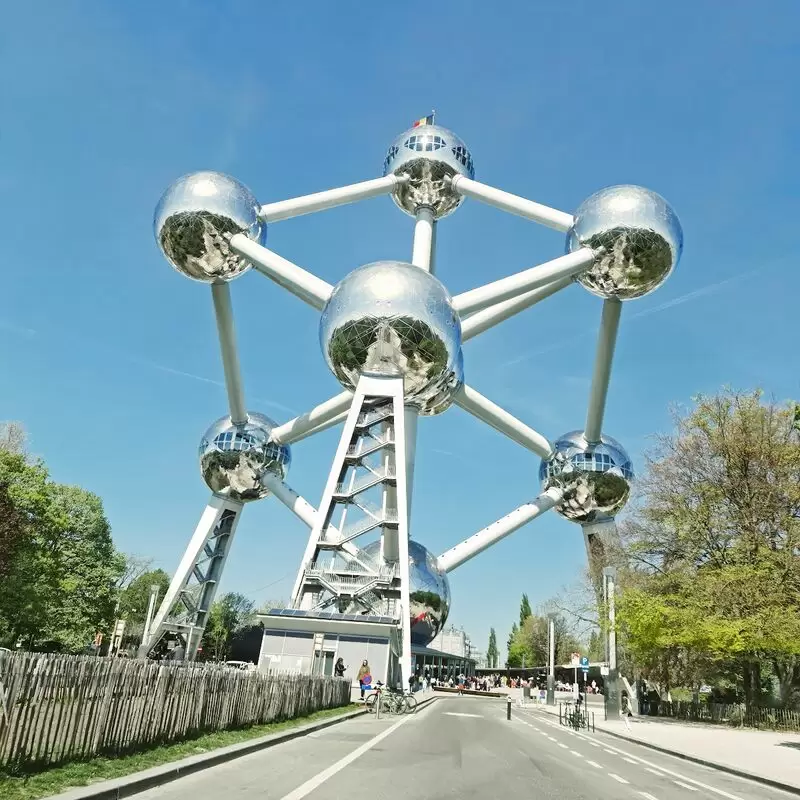 Atomium
Atomium
Pl. de l'Atomium 1, Laeken 1020 Brussels
Monday - Sunday: 10:00 AM – 6:00 PM

Pl. de l'Atomium 1, Laeken 1020 Brussels
3. Parc du Cinquantenaire
A walk through the Parc du Cinquantenaire is an absolute must in Brussels! Not only is the park an urban paradise full of beautiful trees and flowers, but it is also home to three museums, including the largest military museum in Belgium. The iconic Arc de Triomphe, built to celebrate Belgium's 50th anniversary, offers incredible views of the city. Just a short walk away is the stylish European Quarter, home to the European Parliament.
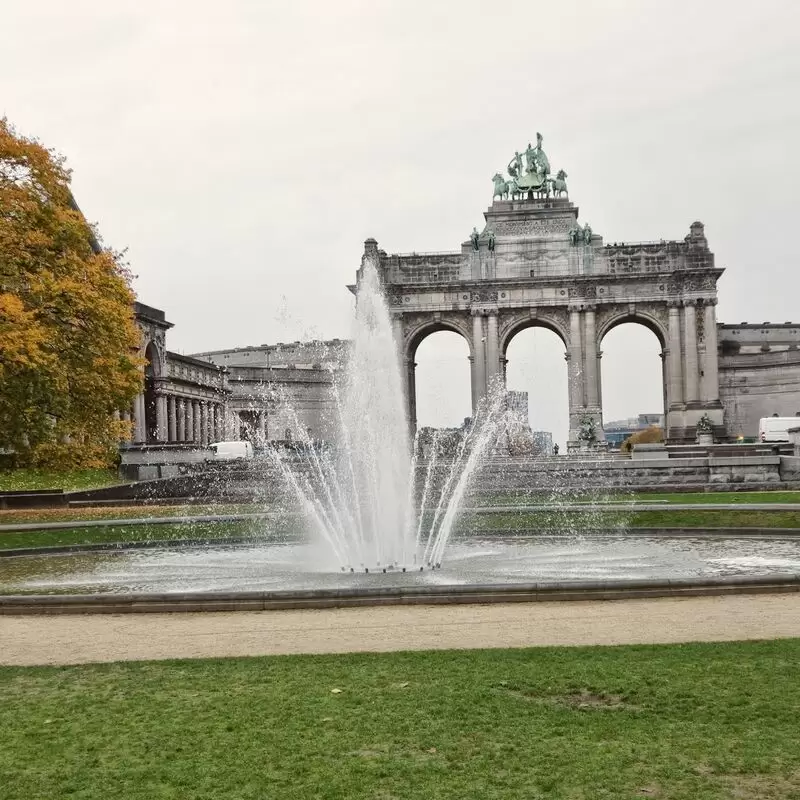 Parc du Cinquantenaire
Parc du Cinquantenaire
Nord-Est 1000 Brussels

Nord-Est 1000 Brussels
4. Royal Gallery of Saint Hubert
Immerse yourself in the luxurious atmosphere of the Royal Gallery of Saint Hubert, one of the oldest shopping arcades in the world. Admired for its rich architecture dating back to 1847, it offers a range of high-end chocolate stores, boutiques and jewelers. The intricate glass ceilings and marble columns leave you in awe. Belgium's famous comic book center, the Comic Book Museum, is just a few minutes walk away, making the visit even more exciting! A double cultural pleasure in a single visit!
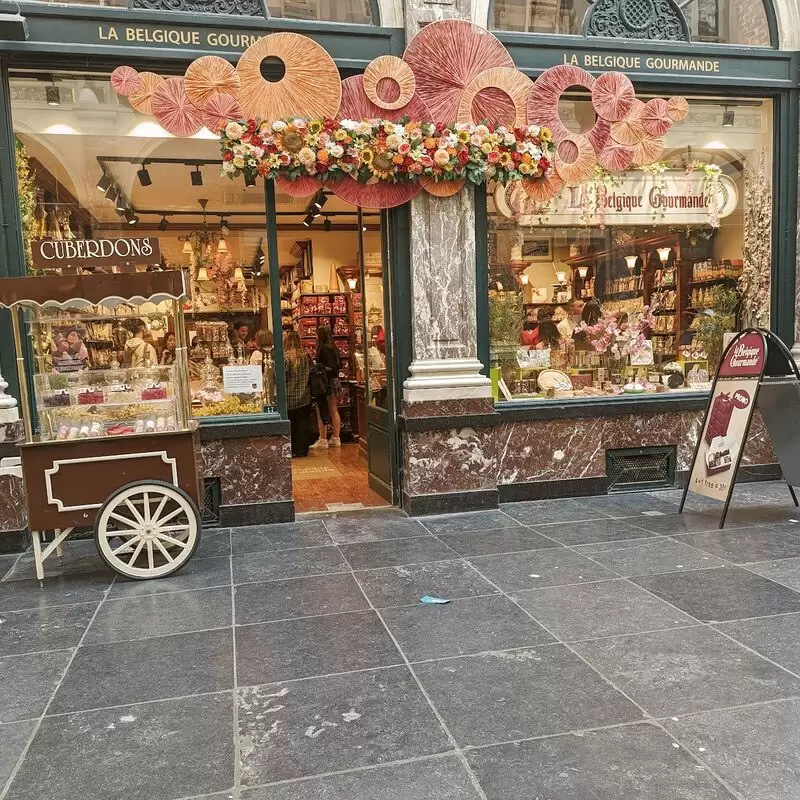 Royal Gallery of Saint Hubert
Royal Gallery of Saint Hubert
Galerie du Roi 5, Pentagone 1000 Brussels
Monday - Sunday: Open 24 hours

Galerie du Roi 5, Pentagone 1000 Brussels
5. Mini Europe
A visit to Mini-Europe in Brussels is like a miniature tour of Europe's architectural wonders. With over 350 carefully crafted models, you can marvel at iconic structures from 27 EU countries, including London's Big Ben and Italy's Leaning Tower of Pisa - all without leaving Belgium! There's even a working model of erupting Mount Vesuvius! The hotel's location in Bruparck also puts it close to the Atomium, another famous Brussels attraction that's perfect for a full day of sightseeing.
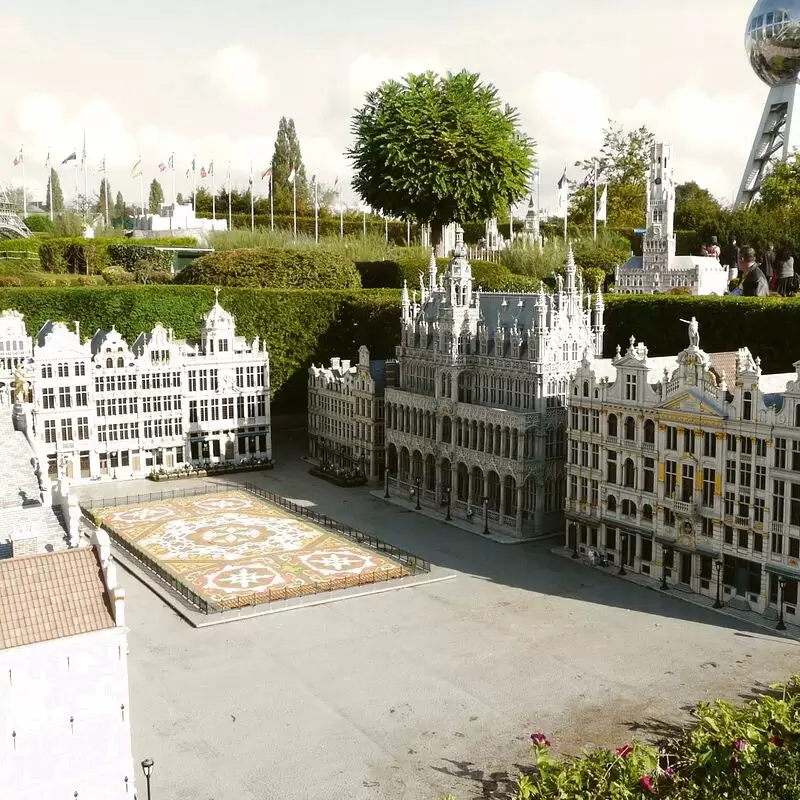 Mini Europe
Mini Europe
Av. du Football 1, Laeken 1020 Brussels
Monday - Sunday: 9:30 AM – 7:00 PM

Av. du Football 1, Laeken 1020 Brussels
6. Royal Palace of Brussels
A visit to the Royal Palace of Brussels is like a journey into a storybook, with its stately splendor and opulent interiors. It is not only the administrative residence of the king, but also a place of history and art. Don't miss the breathtaking Empire Hall or the larger-than-life ceiling painting in the Hall of Mirrors. An insider tip: visit the palace in summer, when it's open to the public. The proximity to Brussels Park provides the perfect backdrop for a royal picnic following your palace tour!
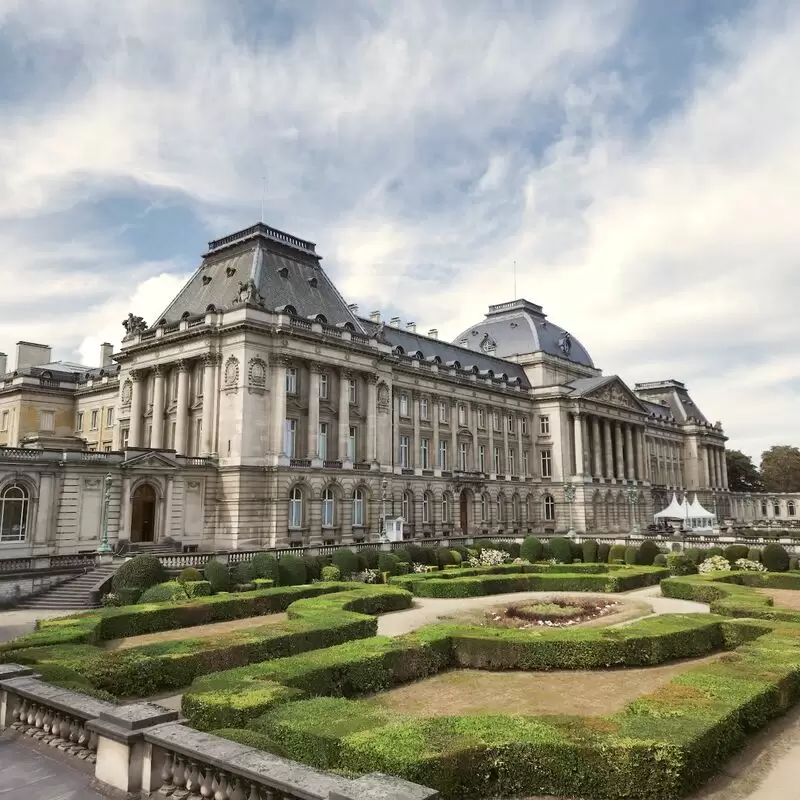 Royal Palace of Brussels
Royal Palace of Brussels
Rue Brederode 16, Pentagone 1000 Brussels

Rue Brederode 16, Pentagone 1000 Brussels
7. Royal Museums of Fine Arts of Belgium
The Royal Museums of Fine Arts of Belgium is an absolute must-see when visiting Brussels. It is the perfect treat for any art lover and houses a stunning collection of over 20,000 works of art and sculptures by famous artists, including Rubens and Magritte. Don't miss the hot chocolate at the museum café, considered the best kept secret in town! Just around the corner you can explore the Mont des Arts, which is a remarkable architectural and historical sight.
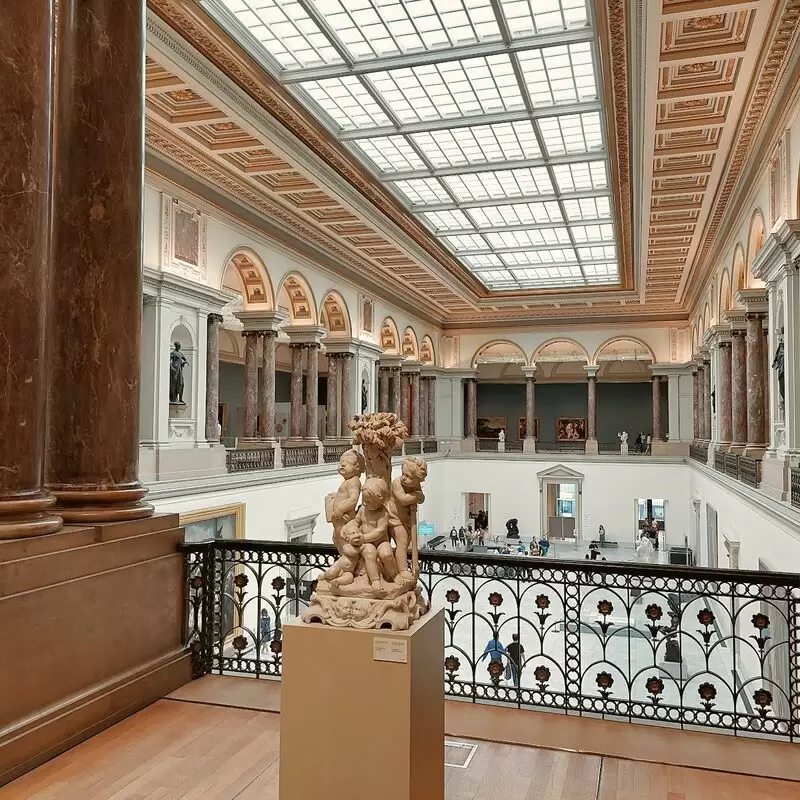 Royal Museums of Fine Arts of Belgium
Royal Museums of Fine Arts of Belgium
Rue de la Régence 3, Pentagone 1000 Brussels
Monday: Closed
Tuesday - Friday: 10:00 AM – 5:00 PM
Saturday - Sunday: 11:00 AM – 6:00 PM

Rue de la Régence 3, Pentagone 1000 Brussels
Tuesday - Friday: 10:00 AM – 5:00 PM
Saturday - Sunday: 11:00 AM – 6:00 PM
8. Koningsplein Beeld van Godfried van Bouillon
A timeless symbol of Brussels' medieval history, the "Koningsplein - Beeld van Godfried van Bouillon" depicts your heroic crusader Godfrey of Bouillon in full armor. Its dramatic pose and intricate details capture the imagination of any visitor. At sunset, the effect is even more dramatic. Then stroll 5 minutes to the majestic Royal Palace of Brussels, another jewel of Belgium's rich heritage. Here, history is more than just a story, it's an experience.
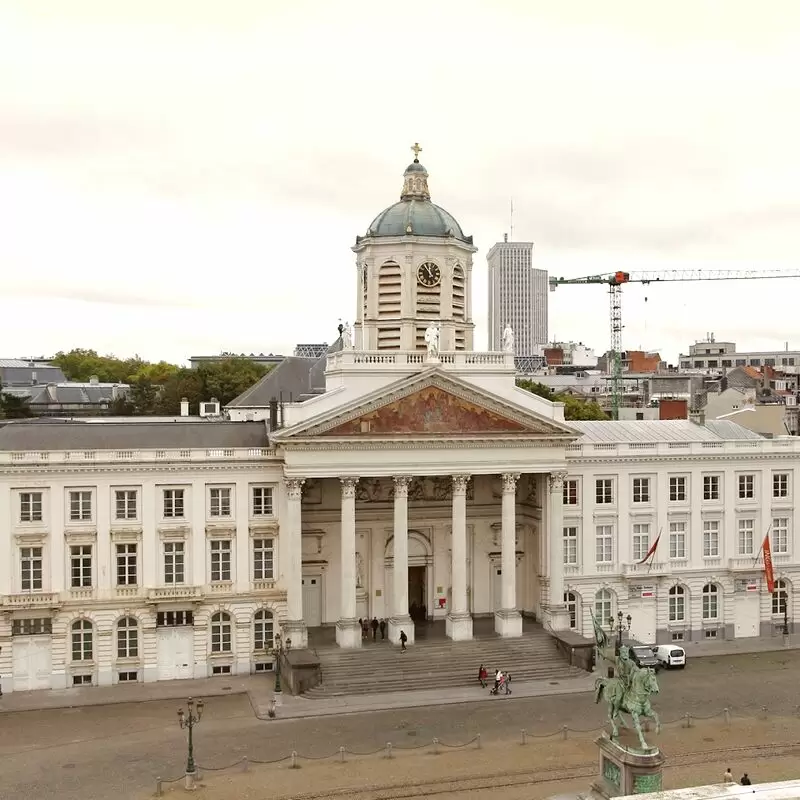 Koningsplein Beeld van Godfried van Bouillon
Koningsplein Beeld van Godfried van Bouillon
Pl. Royale, Pentagone 1000 Brussels
Monday - Sunday: Open 24 hours

Pl. Royale, Pentagone 1000 Brussels
9. Mont des Arts
Visit the Mont des Arts, a breathtaking historical site full of culture. Amidst manicured gardens and elegant architecture, you will be immersed in timeless elegance. Take a look at the impressive panoramic view of Brussels. Immerse yourself in the world of art at the nearby Royal Museums of Fine Arts or the fascinating BELvue Museum. Look out for impromptu street performances that add to the lively atmosphere of the city. Finally, don't leave without seeing the magical nighttime light show, which is a beautiful mystery.
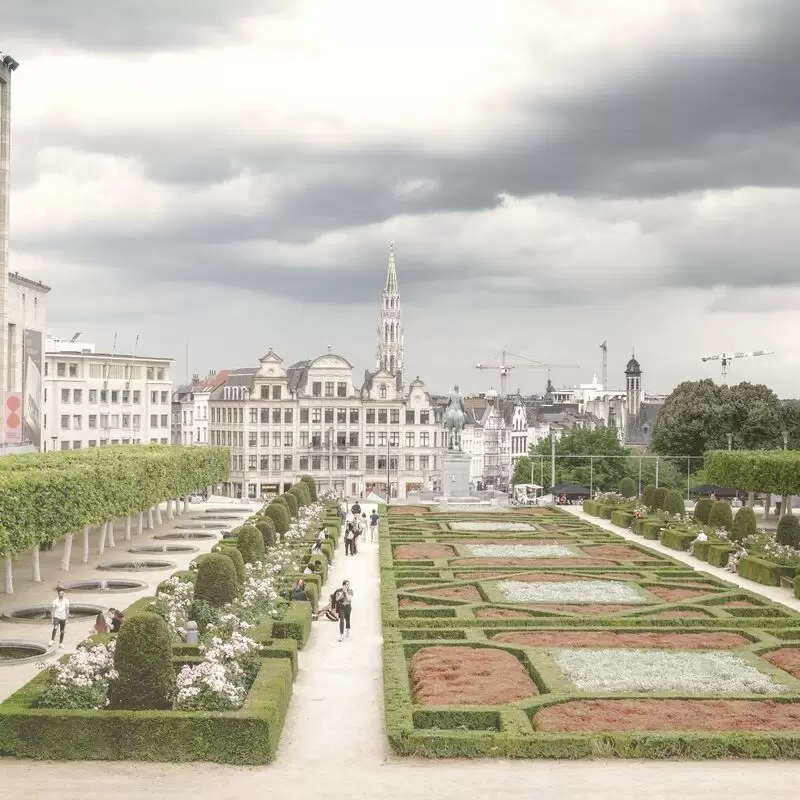 Mont des Arts
Mont des Arts
Pentagone 1000 Brussels

Pentagone 1000 Brussels
10. Church of Our Lady of Victories at the Sablon
The "Church of Our Lady of Victory on the Sablon", popularly known as the "Sablon Church", is an absolute must-see when visiting Brussels. This late Gothic church captivates with its breathtaking stained glass windows from the 16th century. Century. It is located in Sablon, a neighborhood full of antique stores that offers you a stylish cultural experience. After visiting the church, a short walk will take you to Mont des Arts, a hill with a panoramic view of Brussels - a double pleasure.
 Church of Our Lady of Victories at the Sablon
Church of Our Lady of Victories at the Sablon
Rue des Sablons, Pentagone 1000 Brussels
Monday - Friday: 10:00 AM – 6:00 PM
Saturday: 9:00 AM – 6:00 PM
Sunday: 9:00 – 11:45 AM, 1:15 – 6:00 PM

Rue des Sablons, Pentagone 1000 Brussels
Saturday: 9:00 AM – 6:00 PM
Sunday: 9:00 – 11:45 AM, 1:15 – 6:00 PM
11. Manneken Pis
Manneken Pis may be small, but it's a real icon! This strange bronze statue of a urinating boy embodies the quirky charm of Brussels. Don't be surprised if you come across him in costume - he has a closet of over 900 costumes! Round out your visit with a Belgian beer at nearby Poechenellekelder, a traditional pub where locals revel in folklore. Also just steps away is the impressive Grand Place, a UNESCO World Heritage Site known for its decorative guild houses.
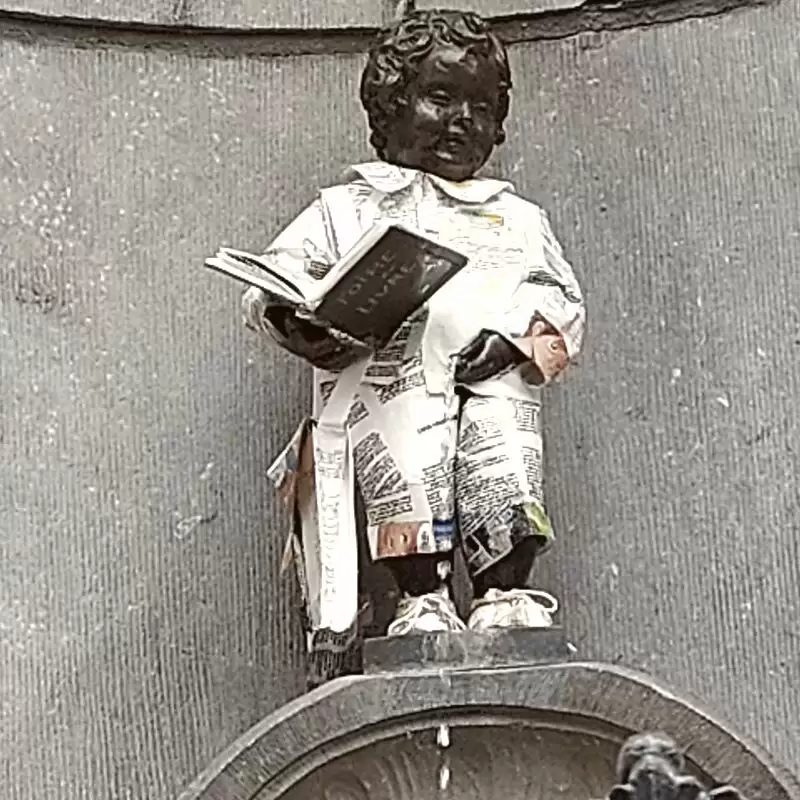 Manneken Pis
Manneken Pis
Pentagone 1000 Brussels

Pentagone 1000 Brussels
12. Musical Instruments Museum
Located in Brussels, the Musical Instrument Museum (MIM) is a must-see for music lovers. The museum houses more than 8,000 rare and unique instruments and allows you to immerse yourself in the beautiful history of various musical genres. The magnificent architecture of the former Old England Department Store adds to its appeal. Don't miss the panoramic view of the city from the rooftop café! It is located just a stone's throw from the Royal Palace and offers you another exciting sightseeing opportunity.
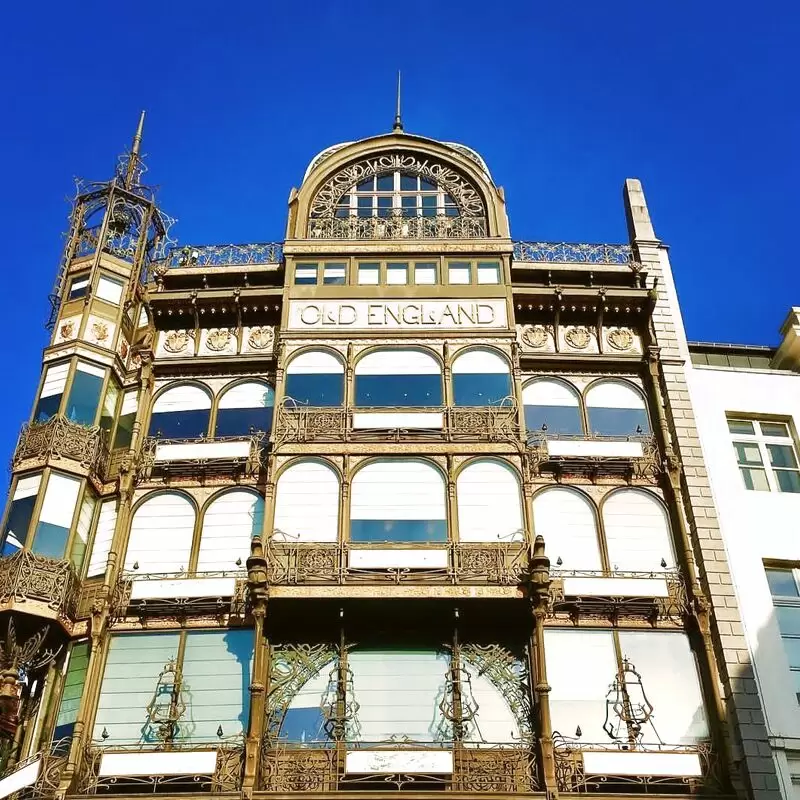 Musical Instruments Museum
Musical Instruments Museum
Rue Montagne de la Cour 2, Pentagone 1000 Brussels
Monday: Closed
Tuesday - Friday: 9:30 AM – 5:00 PM
Saturday - Sunday: 10:00 AM – 5:00 PM

Rue Montagne de la Cour 2, Pentagone 1000 Brussels
Tuesday - Friday: 9:30 AM – 5:00 PM
Saturday - Sunday: 10:00 AM – 5:00 PM
13. Square of Petit Sablon
Visiting the Petit Sablon square is like visiting a fairy tale. It is a beautiful garden with 48 bronze statues representing medieval guilds, a sight that reveals the rich history of the city. A beautiful Gothic fence surrounds the square, creating a unique atmosphere. Just around the corner is the magnificent Notre-Dame du Sablon, a real treat for any architecture lover. Also nearby are the Royal Museums of Fine Arts, a true refuge for art lovers. Immerse yourself in the historic charm of Brussels on the Petit Sablon square!
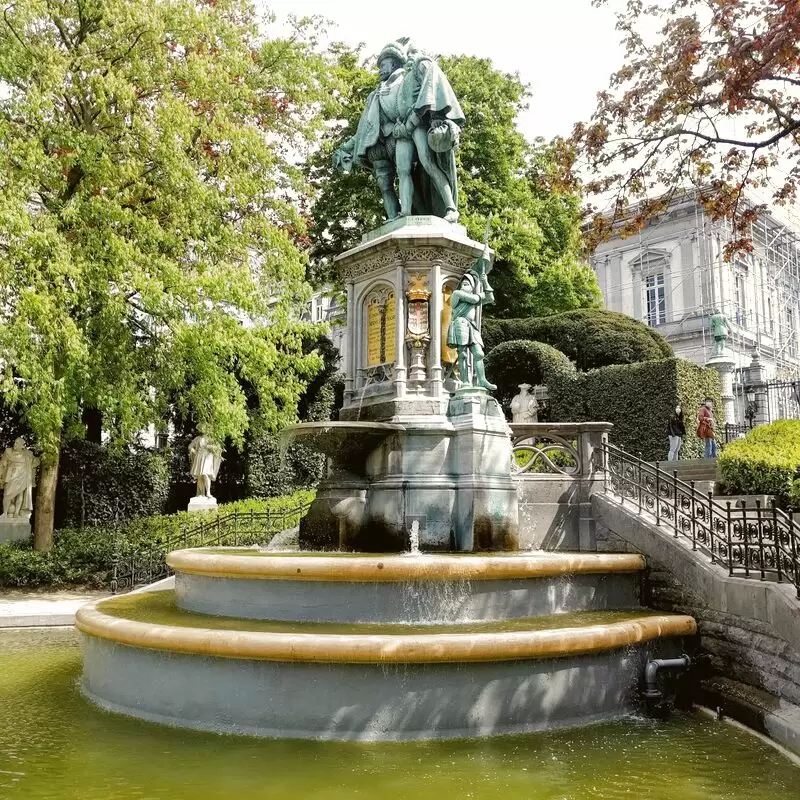 Square of Petit Sablon
Square of Petit Sablon
Pl. du Petit Sablon 12, Pentagone 1000 Brussels
Monday - Sunday: 8:15 AM – 7:45 PM

Pl. du Petit Sablon 12, Pentagone 1000 Brussels
14. Brussels Town Hall
Make your way to the heart of the grand Place de Bruxelles and admire the remarkable Gothic architecture of Brussels City Hall. Admire the intricate stonework, intricate tapestries and extensive art collection, beautifully preserved since the 15th century. Don't miss the lively mix of gargoyles and saints that adorn the facade. A local secret: if you look closely, you'll notice that the tower is not exactly centrally located! Afterwards, visit the Maison du Roi across the street, a museum that reflects the history and culture of the city.
 Brussels Town Hall
Brussels Town Hall
Grand Place 1, Pentagone 1000 Brussels
Monday - Friday: 8:30 AM – 5:30 PM
Saturday - Sunday: Closed

Grand Place 1, Pentagone 1000 Brussels
Saturday - Sunday: Closed
15. National Basilica of the Sacred Heart in Koekelberg
The visit to the National Basilica of the Sacred Heart in Koekelberg is interesting not only because of its religious significance. It is one of the largest churches in the world and offers a breathtaking view of Brussels from its dome. Explore the two museums inside - one displays sacred art, the other is dedicated to the history of the basilica. It's also just a stone's throw from Elisabeth Park, a beautiful green oasis where you can enjoy a picnic of traditional Belgian chocolates. An experience not to be missed!
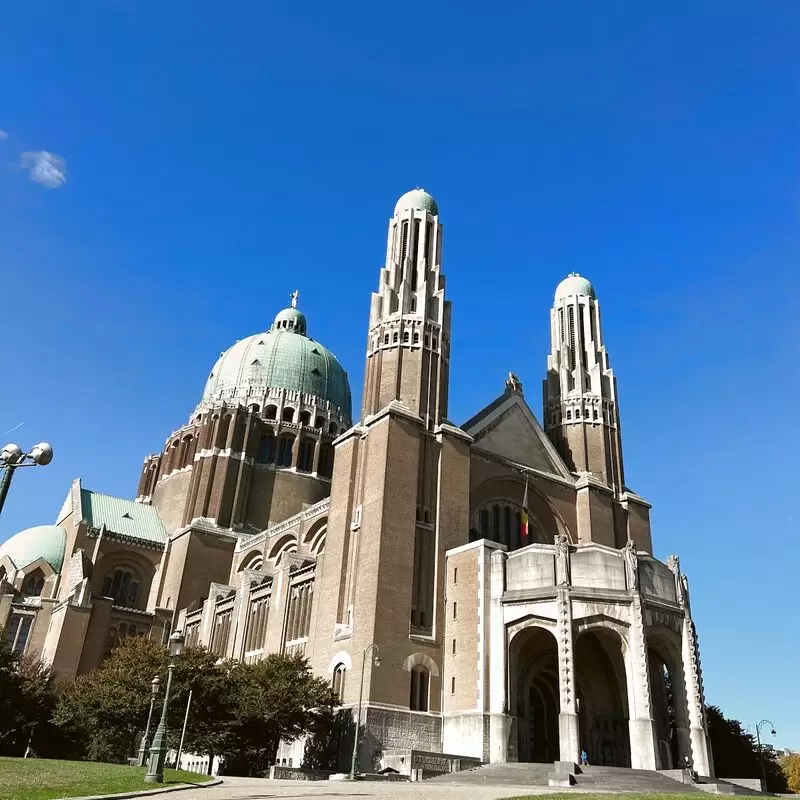 National Basilica of the Sacred Heart in Koekelberg
National Basilica of the Sacred Heart in Koekelberg
Basiliekvoorplein 1, 1083 Brussels
Monday - Sunday: 8:00 AM – 5:00 PM

Basiliekvoorplein 1, 1083 Brussels
Best Time to Visit Brussels
The best time to visit Brussels is from June to August, when the weather is warmest. Spring (April-May) is also a good time with fewer crowds. Remember, however, that it often rains in Brussels throughout the year, so remember your umbrella. The beautiful flower carpet takes place every two years in mid-August.
Annual Weather in Brussels
January
Jan
35 / 47 °F
1 / 8 °C
1
8
34
February
Feb
35 / 52 °F
2 / 11 °C
1
6
36
March
Mar
38 / 57 °F
3 / 14 °C
1
5
49
April
Apr
42 / 67 °F
6 / 19 °C
0
5
55
May
May
48 / 71 °F
9 / 22 °C
1
6
50
June
Jun
54 / 74 °F
12 / 23 °C
1
6
51
July
Jul
57 / 81 °F
14 / 27 °C
1
6
53
August
Aug
58 / 82 °F
14 / 28 °C
1
6
59
September
Sep
53 / 73 °F
12 / 23 °C
1
5
56
October
Oct
48 / 66 °F
9 / 19 °C
1
7
47
November
Nov
42 / 55 °F
6 / 13 °C
1
7
37
December
Dec
37 / 51 °F
3 / 11 °C
1
9
33
Questions & Answers
What currency is used in Brussels?
The currency used in Brussels is the Euro (€). It is the official currency of Belgium, which is a member of the European Union. You will find banknotes in denominations of 5, 10, 20, 50, 100, 200 and 500 euros, while coins in denominations of 1 and 2 euros and smaller cent pieces in denominations of 0.01, 0.02, 0.05, 0.10, 0.20 and 0.50 are available.
How do I use public transportation in Brussels?
In Brussels, you can easily use public transport such as buses, streetcars and metros operated by STIB-MIVB. Depending on your needs, you can buy tickets or unlimited tickets at the kiosks or online. The subway runs from 5 a.m. to midnight, while night buses are available for after-hours trips. Be sure to validate your ticket before boarding, or fines may apply. The extensive streetcar and bus network ensures good connections to different parts of the city.
Are credit cards widely accepted in Brussels?
Yes, credit cards are widely accepted in Brussels, both from international and local companies. Major cards such as Visa, Mastercard and American Express are commonly used. However, it is always advisable to carry some cash, especially for small purchases or in less touristy areas, as some smaller stores or cafes require a minimum card payment or only accept cash.
Is Brussels safe for tourists?
Yes, Brussels is generally considered safe for tourists. However, it is recommended to be cautious as minor street crime such as pickpocketing can occur, especially in crowded places, near famous landmarks and on public transport. It is advisable to use common sense, be aware of your surroundings and avoid isolated areas at night. Emergency services in Brussels are responsive and efficient. In addition, locals are very helpful and most speak English, which increases safety for international tourists.
What are the local delicacies I must try in Brussels?
The culinary scene in Brussels is a mix of tradition and modernity. Try the national dish "Moules Frites", a hearty portion of mussels with French fries. Belgian waffles, light and crispy with a variety of toppings, are a must for dessert lovers. The chocolates and truffles from the famous chocolate makers are world famous. And finally, you should try the local beers: Brussels offers a rich selection of beers, ranging from strong Trappist beers to light, fruity lambics.
Do people in Brussels speak English?
Yes, a significant number of people in Brussels speak English, especially those who work in tourism, hospitality and business. Immigrants and younger generations also frequently speak English. Although French and Dutch are the official languages, English is widely understood and accepted, making it relatively easy for English-speaking tourists to communicate while in the city. However, learning a few phrases in French or Dutch can enhance your travel experience.
Is Brussels expensive to visit?
Visiting Brussels can be quite expensive depending on your budget and lifestyle. The cost of accommodation, food and transportation is relatively high compared to other European cities. However, there are many free and affordable activities such as visiting parks, historical sites and markets. For luxury travelers, there are also upscale dining, shopping and lodging options. Overall, Brussels offers a range of options for different budgets.
What is the tipping etiquette in Brussels?
In Brussels, tipping in restaurants, bars, cabs or for other services is neither mandatory nor expected. However, if the service is exceptional, you are welcome to leave a small tip, usually rounded up to the nearest euro. For exemplary service in upscale establishments, a tip of 5-10% is considered generous. Always check your bill before tipping, as some establishments already include service, in which case an additional tip is not necessary.
What is the dress code in Brussels?
Brussels has a casual but elegant dress code. Belgians prefer modest and conservative clothing, and light clothing is recommended for the summer months. In winter, warm clothing and a raincoat or umbrella are essential due to the humid climate in the city. High-quality, comfortable shoes are beneficial for exploring the cobblestone streets. For restaurants and theater visits, it is customary to dress a bit more formally.
Can I drink the tap water in Brussels?
Yes, the tap water in Brussels is safe to drink. The water undergoes rigorous testing and treatment processes to ensure that it meets quality standards. Brussels municipal authorities constantly monitor water quality, and it is often considered better than bottled water because it is more environmentally friendly. However, taste can vary due to mineral content, especially calcium. You can also use it for cooking and brushing your teeth without hesitation.
Are there specific customs or etiquette I need to be aware of in Brussels?
In Brussels, greetings are important and usually include a handshake or a kiss on the cheek between friends. Belgians are known for their punctuality, and it is considered disrespectful to be late for meetings or appointments. Although Belgians appreciate politeness, they are more formal than Americans. People tend to dress conservatively, and loud public speaking is frowned upon. Tipping is not common, as the cost of service is included in the bill, but a small tip is appreciated for excellent service.
What is the healthcare situation in Brussels?
Healthcare in Brussels is of a high standard and is run efficiently. Services are provided by a mix of public, semi-public and private hospitals, where health care can be very reliable. The health care system is mainly financed by social security contributions and health insurance. Residents of Belgium are required by law to enroll in a government-funded health insurance plan. Non-residents may also be required to provide proof of private health insurance. It is advisable to have a European Health Insurance Card (EHIC) when seeking healthcare services.
Can I rent a bike in Brussels?
Yes, you can definitely rent a bike in Brussels. The city offers a variety of bike rental services for all types of riders. One of the most popular services are the Villo! self-service stations located throughout the city. There are also several bike stores that rent bikes for longer trips. Cycling is a great way to explore Brussels, as the city has an extensive network of bike paths and the terrain is generally flat. Remember to obey traffic rules and wear safety equipment when cycling.
Is it easy to get a taxi in Brussels?
Yes, it is quite easy to get a cab in Brussels. Cabs are available at cab stands, major hotels and train stations and are often seen on the streets. You can also book a cab by phone or through various mobile apps. However, keep in mind that Brussels' extensive public transportation system is often a faster, cheaper, and equally convenient alternative, as traffic in the city can sometimes be a bit heavy.
Are there any local markets I should visit in Brussels?
The Sunday market at the Gare du Midi is popular with locals and tourists alike and offers a wide selection of fruits, vegetables, and European cheeses. There's also the daily fish market at Place St. Catherine, where you can sample some of the freshest seafood in town. Antiques and curiosities can be found at the lively Marolles Flea Market at Place du Jeu de Balle. Each market is full of local culture and definitely worth a visit.
Are museums in Brussels free of charge?
Most museums in Brussels, Belgium, charge an entrance fee, which varies depending on the museum. However, there are some museums that offer free admission on certain days, usually the first Sunday of each month. The Brussels Card gives you free access to over 40 museums in the city for a set price. You can find detailed information about the fees on the websites of the individual museums.
Is Brussels a walkable city?
Yes, Brussels is indeed a city to explore on foot. The compact city center, also called the Pentagon, is full of charming pedestrian streets and squares that offer a rich mix of history, culture and culinary delights. Places like the Grand Place, the Manneken Pis and the Royal Palace can be easily explored on foot. In addition, the city has invested significantly in pedestrian infrastructure, ensuring comfortable and safe walking. However, public transportation is available for longer distances.
What is the nightlife like in Brussels?
Nightlife in Brussels is lively and diverse. The city offers a range of venues, from sophisticated cocktail bars and elegant nightclubs to cozy beer bars and live music venues. The city center is lively, and many pubs are open until the wee hours of the morning. Belgian beer is iconic, but you can also enjoy a wide selection of international spirits. The trendy pubs offer something for everyone, whether you are a jazz lover, a fan of electronic music or a lover of classic pubs.
Are there any must-try beers in Brussels?
Absolutely! Brussels is known for its craft beers. Be sure to try the Cantillon Brewery's lambic beers, which are given a unique flavor through spontaneous fermentation. Another popular beer is the strong, fruity Tripel Karmeliet. The Trappist beers from Saint Sixtus Abbey are a unique experience, especially Westvleteren 12, which is sometimes called "the best beer in the world. Finally, don't miss Delirium Tremens, known for its pink elephant logo and lively flavors.
How accessible is Brussels for people with disabilities?
Brussels is well accessible for people with disabilities. There are several disabled parking spaces throughout the city and public transport such as buses and streetcars are equipped with facilities for people with mobility impairments. Many public buildings, hotels, restaurants and tourist attractions have wheelchair accessible entrances and restrooms. However, certain cobblestone streets and older buildings can be challenging. It is recommended to plan ahead and check certain places for accessibility.
Feedback
I hope you found this article informative and helpful. I'm eager to improve the content and make it even more valuable for you. If you have any feedback or suggestions, I would love to hear from you.
Do you have any tips or hidden gems that you think should be added to the list? Are there any areas that you feel could use more explanation or clarification?
Your input is greatly appreciated and will help us to continue providing high-quality content that meets your needs and interests. Please feel free to share your thoughts.
What currency is used in Brussels?
The currency used in Brussels is the Euro (€). It is the official currency of Belgium, which is a member of the European Union. You will find banknotes in denominations of 5, 10, 20, 50, 100, 200 and 500 euros, while coins in denominations of 1 and 2 euros and smaller cent pieces in denominations of 0.01, 0.02, 0.05, 0.10, 0.20 and 0.50 are available.
How do I use public transportation in Brussels?
In Brussels, you can easily use public transport such as buses, streetcars and metros operated by STIB-MIVB. Depending on your needs, you can buy tickets or unlimited tickets at the kiosks or online. The subway runs from 5 a.m. to midnight, while night buses are available for after-hours trips. Be sure to validate your ticket before boarding, or fines may apply. The extensive streetcar and bus network ensures good connections to different parts of the city.
Are credit cards widely accepted in Brussels?
Yes, credit cards are widely accepted in Brussels, both from international and local companies. Major cards such as Visa, Mastercard and American Express are commonly used. However, it is always advisable to carry some cash, especially for small purchases or in less touristy areas, as some smaller stores or cafes require a minimum card payment or only accept cash.
Is Brussels safe for tourists?
Yes, Brussels is generally considered safe for tourists. However, it is recommended to be cautious as minor street crime such as pickpocketing can occur, especially in crowded places, near famous landmarks and on public transport. It is advisable to use common sense, be aware of your surroundings and avoid isolated areas at night. Emergency services in Brussels are responsive and efficient. In addition, locals are very helpful and most speak English, which increases safety for international tourists.
What are the local delicacies I must try in Brussels?
The culinary scene in Brussels is a mix of tradition and modernity. Try the national dish "Moules Frites", a hearty portion of mussels with French fries. Belgian waffles, light and crispy with a variety of toppings, are a must for dessert lovers. The chocolates and truffles from the famous chocolate makers are world famous. And finally, you should try the local beers: Brussels offers a rich selection of beers, ranging from strong Trappist beers to light, fruity lambics.
Do people in Brussels speak English?
Yes, a significant number of people in Brussels speak English, especially those who work in tourism, hospitality and business. Immigrants and younger generations also frequently speak English. Although French and Dutch are the official languages, English is widely understood and accepted, making it relatively easy for English-speaking tourists to communicate while in the city. However, learning a few phrases in French or Dutch can enhance your travel experience.
Is Brussels expensive to visit?
Visiting Brussels can be quite expensive depending on your budget and lifestyle. The cost of accommodation, food and transportation is relatively high compared to other European cities. However, there are many free and affordable activities such as visiting parks, historical sites and markets. For luxury travelers, there are also upscale dining, shopping and lodging options. Overall, Brussels offers a range of options for different budgets.
What is the tipping etiquette in Brussels?
In Brussels, tipping in restaurants, bars, cabs or for other services is neither mandatory nor expected. However, if the service is exceptional, you are welcome to leave a small tip, usually rounded up to the nearest euro. For exemplary service in upscale establishments, a tip of 5-10% is considered generous. Always check your bill before tipping, as some establishments already include service, in which case an additional tip is not necessary.
What is the dress code in Brussels?
Brussels has a casual but elegant dress code. Belgians prefer modest and conservative clothing, and light clothing is recommended for the summer months. In winter, warm clothing and a raincoat or umbrella are essential due to the humid climate in the city. High-quality, comfortable shoes are beneficial for exploring the cobblestone streets. For restaurants and theater visits, it is customary to dress a bit more formally.
Can I drink the tap water in Brussels?
Yes, the tap water in Brussels is safe to drink. The water undergoes rigorous testing and treatment processes to ensure that it meets quality standards. Brussels municipal authorities constantly monitor water quality, and it is often considered better than bottled water because it is more environmentally friendly. However, taste can vary due to mineral content, especially calcium. You can also use it for cooking and brushing your teeth without hesitation.
Are there specific customs or etiquette I need to be aware of in Brussels?
In Brussels, greetings are important and usually include a handshake or a kiss on the cheek between friends. Belgians are known for their punctuality, and it is considered disrespectful to be late for meetings or appointments. Although Belgians appreciate politeness, they are more formal than Americans. People tend to dress conservatively, and loud public speaking is frowned upon. Tipping is not common, as the cost of service is included in the bill, but a small tip is appreciated for excellent service.
What is the healthcare situation in Brussels?
Healthcare in Brussels is of a high standard and is run efficiently. Services are provided by a mix of public, semi-public and private hospitals, where health care can be very reliable. The health care system is mainly financed by social security contributions and health insurance. Residents of Belgium are required by law to enroll in a government-funded health insurance plan. Non-residents may also be required to provide proof of private health insurance. It is advisable to have a European Health Insurance Card (EHIC) when seeking healthcare services.
Can I rent a bike in Brussels?
Yes, you can definitely rent a bike in Brussels. The city offers a variety of bike rental services for all types of riders. One of the most popular services are the Villo! self-service stations located throughout the city. There are also several bike stores that rent bikes for longer trips. Cycling is a great way to explore Brussels, as the city has an extensive network of bike paths and the terrain is generally flat. Remember to obey traffic rules and wear safety equipment when cycling.
Is it easy to get a taxi in Brussels?
Yes, it is quite easy to get a cab in Brussels. Cabs are available at cab stands, major hotels and train stations and are often seen on the streets. You can also book a cab by phone or through various mobile apps. However, keep in mind that Brussels' extensive public transportation system is often a faster, cheaper, and equally convenient alternative, as traffic in the city can sometimes be a bit heavy.
Are there any local markets I should visit in Brussels?
The Sunday market at the Gare du Midi is popular with locals and tourists alike and offers a wide selection of fruits, vegetables, and European cheeses. There's also the daily fish market at Place St. Catherine, where you can sample some of the freshest seafood in town. Antiques and curiosities can be found at the lively Marolles Flea Market at Place du Jeu de Balle. Each market is full of local culture and definitely worth a visit.
Are museums in Brussels free of charge?
Most museums in Brussels, Belgium, charge an entrance fee, which varies depending on the museum. However, there are some museums that offer free admission on certain days, usually the first Sunday of each month. The Brussels Card gives you free access to over 40 museums in the city for a set price. You can find detailed information about the fees on the websites of the individual museums.
Is Brussels a walkable city?
Yes, Brussels is indeed a city to explore on foot. The compact city center, also called the Pentagon, is full of charming pedestrian streets and squares that offer a rich mix of history, culture and culinary delights. Places like the Grand Place, the Manneken Pis and the Royal Palace can be easily explored on foot. In addition, the city has invested significantly in pedestrian infrastructure, ensuring comfortable and safe walking. However, public transportation is available for longer distances.
What is the nightlife like in Brussels?
Nightlife in Brussels is lively and diverse. The city offers a range of venues, from sophisticated cocktail bars and elegant nightclubs to cozy beer bars and live music venues. The city center is lively, and many pubs are open until the wee hours of the morning. Belgian beer is iconic, but you can also enjoy a wide selection of international spirits. The trendy pubs offer something for everyone, whether you are a jazz lover, a fan of electronic music or a lover of classic pubs.
Are there any must-try beers in Brussels?
Absolutely! Brussels is known for its craft beers. Be sure to try the Cantillon Brewery's lambic beers, which are given a unique flavor through spontaneous fermentation. Another popular beer is the strong, fruity Tripel Karmeliet. The Trappist beers from Saint Sixtus Abbey are a unique experience, especially Westvleteren 12, which is sometimes called "the best beer in the world. Finally, don't miss Delirium Tremens, known for its pink elephant logo and lively flavors.
How accessible is Brussels for people with disabilities?
Brussels is well accessible for people with disabilities. There are several disabled parking spaces throughout the city and public transport such as buses and streetcars are equipped with facilities for people with mobility impairments. Many public buildings, hotels, restaurants and tourist attractions have wheelchair accessible entrances and restrooms. However, certain cobblestone streets and older buildings can be challenging. It is recommended to plan ahead and check certain places for accessibility.
Feedback
I hope you found this article informative and helpful. I'm eager to improve the content and make it even more valuable for you. If you have any feedback or suggestions, I would love to hear from you.
Do you have any tips or hidden gems that you think should be added to the list? Are there any areas that you feel could use more explanation or clarification?
Your input is greatly appreciated and will help us to continue providing high-quality content that meets your needs and interests. Please feel free to share your thoughts.
I hope you found this article informative and helpful. I'm eager to improve the content and make it even more valuable for you. If you have any feedback or suggestions, I would love to hear from you.
Do you have any tips or hidden gems that you think should be added to the list? Are there any areas that you feel could use more explanation or clarification?
Your input is greatly appreciated and will help us to continue providing high-quality content that meets your needs and interests. Please feel free to share your thoughts.

